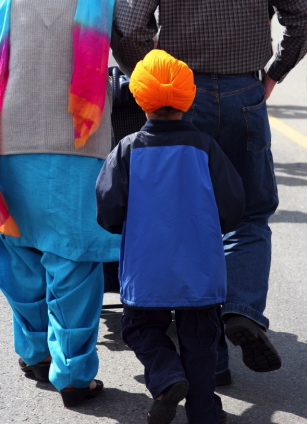
London, Nov 24 – Washington, Nov 22 (IANS) — Many young Sikh men who have cut their hair say they did so to escape the humiliation of turban searches at Western airports or to avoid being mistaken for Muslims, according to the Times newspaper.
A growing number of young Sikh men are now unfurling their turbans, shaving their beards and trimming their hair. And this trend is not only confined to the overseas Sikh community but also increasing in India as well.
There have been many instances of Sikhs being targeted for their long hair and turbans.
Balbir Singh Sodi, a petrol station owner, was shot dead in Arizona in the US on September 15, 2001. His American killer, bent on revenge for 9/11, thought that Sodi’s turban indicated that he was an Arab.
Turbans have been banned from French state schools, as have Muslim headscarves, under a ‘secularity’ law that came into effect in 2004.
“Sikhs in turbans gave their lives by the thousands to defend France and other Western countries in the First and Second World Wars,” said Avtar Singh Makkar, member of Shiromani Gurdwara Prabandhak Committee (SGPC), the community’s top decision-making body. “Why should they be denied the freedom that they fought and died for?”
Last month, a court in Denmark upheld a ruling that an Indian Sikh had broken the law by carrying his ceremonial dagger, the kirpan, in public.
And only last week a Sikh teenager was abused and his hair cut off by a gang of youths in Edinburgh.
Community leaders fear that the turban may now also be banned in Britain, home to about 500,000 Sikhs. The SGPC has already written to Tony Blair and other top European leaders to protect the rights of the Sikhs.
The issue is serious enough to have prompted the SGPC to speak out. “This is a challenge to the traditional Sikh identity,” said Singh.
Singh attributed the alarming trend among Sikh youths to the influence of Western culture.
“Young boys are doing this because they want to look smart. They think this because of the influence of modern culture through the Western media,” he said. “It is our task to educate them about the sacrifices that have been made for their religion and to bring them back to their faith.”

Meanwhile, in an effort to bridge the culture-security gap, a Sikh legal group and the US Homeland Security Department have devised a poster meant to help screeners through their interactions with the community.
The poster, which will be distributed to federal agencies across the country, shows photos of different kirpans, a ceremonial dagger that the Sikhs are required to always wear by their religion, the Washington Post said Monday.
The centuries-old requirement has collided with beefed-up, post 9/11 rules that no longer allow people to leave legal weapons and other banned items with security guards working in such buildings as courthouses and federal offices.
In two-dozen cases in the last two years, Sikhs have been arrested, threatened with arrest or harassed in disputes with guards over the ceremonial kirpan, according to the Sikh American Legal Defence and Education Fund.
The poster shows kirpans ranging from a symbolic necklace some women wear to the more common three-to six-inch daggers as well as full swords. Sikhs often wear them under their clothing, bound to them by a cloth body holster.
The kirpan, one of five items Sikhs are required to wear, is meant as a reminder of the duty to uphold justice. The others are reminders of other things: the kesh, or Sikhs’ uncut hair, to live as god created you; kanga, a wooden comb, to remain neat; kara, a bracelet, to do good deeds; and kachera, or large underwear, to remain chaste and faithful sexually.
“These articles are a constant reminder to me of what my duties are,” said Manjit Singh, co-founder and chairman of the legal fund.
Although Sikhs still can’t take the wooden or steel-handled knives – which sometimes have blunted tips – into government buildings, the poster tells security workers how to navigate the situation.
“Respectfully ask if a Sikh is carrying a kirpan. If so, request to inspect the kirpan,” the poster reads. “If a kirpan must be confiscated, explain the reason(s) and handle the kirpan with respect and care.”
Sikhs are accustomed to packing their kirpan in their luggage when they fly.
Screeners also went through a similar education campaign after September 11 about the turbans Sikh men are required to wear. Turbans are often made of 20 feet of fabric and taking them off and putting them on are elaborate processes.
“For Sikh Americans, this is a huge and significant accomplishment,” Singh said of the poster, which tells screeners to “show respect to all variations of faith“.
© 2006 IANS India Private Limited, New Delhi. Posted on Religioscope with permission. — Indo-Asian News Service (IANS) is India’s first multinational and multilingual wire service. Website: www.ians.in. Subscription enquiries: contact IANS (mention Religioscope).